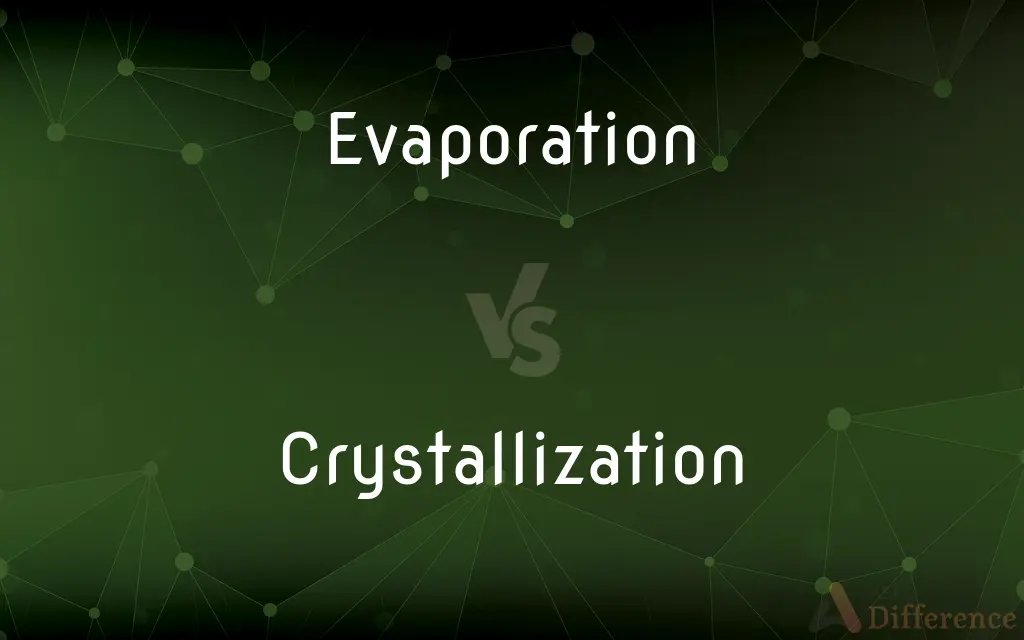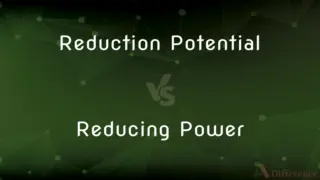Evaporation vs. Crystallization — What's the Difference?
By Tayyaba Rehman — Published on November 26, 2023
Evaporation is the process where liquid turns into vapor, while Crystallization involves the formation of solid crystals from a solution or melt.

Difference Between Evaporation and Crystallization
Table of Contents
ADVERTISEMENT
Key Differences
Evaporation and Crystallization are both crucial processes in science and everyday life, but they serve different purposes. Evaporation is the phenomenon where molecules in a liquid state become vapor, often when exposed to air. It's a natural process driven by the energy from surrounding sources, like the sun. Crystallization, however, is the formation of solid crystals from a supersaturated solution, melt, or, less commonly, a gas.
Evaporation often occurs on the surface of liquids. This process can happen at any temperature, not just the boiling point. The rate of evaporation can be influenced by factors like surface area, temperature, and humidity. Crystallization, in contrast, can be seen when a solution has more solute than it can normally hold, leading to the formation of solid crystals. These crystals often have a defined geometric pattern, inherent to the substance's molecular structure.
Understanding Evaporation is essential for activities like drying clothes or even our body's natural cooling mechanism through sweating. When liquid sweat evaporates, it removes heat from the skin, cooling the body. Crystallization has myriad applications, from the production of table salt and sugar to the formation of gemstones and even snowflakes.
While Evaporation tends to result in the loss of a liquid, leaving behind any dissolved solutes, Crystallization focuses on the creation of a solid from a solution. In a sense, evaporation can precede crystallization: as a solution evaporates and becomes concentrated, it might reach a point where it becomes supersaturated, leading to crystallization.
In labs, evaporation is frequently used to concentrate solutions, while crystallization can be employed to purify compounds, as impurities are often excluded from the growing crystal structure. In both processes, understanding the variables at play—be it temperature, concentration, or even the presence of a seed crystal—can influence the outcomes of evaporation and crystallization.
ADVERTISEMENT
Comparison Chart
Nature of Process
Transformation of liquid to vapor.
Formation of solid crystals from a solution, melt, or rarely, a gas.
Driving Force
Energy from surroundings (e.g., heat).
Supersaturation of a solution.
Result
Loss of liquid, leaving behind solutes.
Formation of solid with a defined geometric pattern.
Common Applications
Drying clothes, body cooling through sweat.
Production of salts, sugars, gemstones.
Relation to Temperature & Concentration
Can occur below boiling point, affected by temperature.
Often triggered when a solution's temperature or concentration changes.
Compare with Definitions
Evaporation
A surface phenomenon occurring below the boiling point.
Even in the morning coolness, some evaporation from the lake occurred.
Crystallization
The formation of solid structures with a geometric pattern.
The crystallization of water molecules results in snowflakes.
Evaporation
A mechanism of concentration, leaving solutes behind.
Evaporation of the saltwater left a crust of salt on the surface.
Crystallization
Can be initiated by introducing a seed crystal.
To expedite the process, a seed was added to encourage crystallization.
Evaporation
A natural cooling method observed in sweating.
The principle of evaporation is the reason we feel cool when sweat evaporates from our skin.
Crystallization
The process of forming solid crystals from a solution or melt.
Sugar crystallization is observed when making rock candy.
Evaporation
The transformation of a liquid into vapor.
Water in the puddle underwent evaporation under the sun's heat.
Crystallization
A technique for purifying substances by excluding impurities.
Crystallization is often used in labs to obtain pure compounds.
Evaporation
The process driven by external energy sources like heat.
Rapid evaporation in deserts is due to the intense heat.
Crystallization
Occurs when a solution reaches supersaturation.
Upon cooling the saturated salt solution, crystallization began.
Evaporation
To convert or change into a vapor.
Crystallization
To cause to form crystals or assume a crystalline structure.
Evaporation
To draw off in the form of vapor.
Crystallization
To give a definite, precise, and usually permanent form to
The scientists finally crystallized their ideas about the role of the protein.
Evaporation
To draw moisture from, as by heating, leaving only the dry solid portion.
Crystallization
To coat with crystals, as of sugar.
Evaporation
To deposit (a metal) on a substrate by vacuum sublimation.
Crystallization
To assume a crystalline form.
Evaporation
To change into vapor.
Crystallization
To take on a definite, precise, and usually permanent form.
Evaporation
To pass off in or as vapor.
Crystallization
The act or process by which a substance in solidifying assumes the form and structure of a crystal, or becomes crystallized.
Evaporation
To produce vapor.
Crystallization
The body formed by crystallizing.
Silver on precipitation forms arborescent crystallizations.
Evaporation
To disappear; vanish
Our fears at last evaporated.
Crystallization
The formation of a solid from a solution, melt, vapour or from a different solid phase
Evaporation
The process of a liquid converting to the gaseous state.
Crystallization
The process or the result of becoming more definite or precise.
Evaporation
The process in which all or a portion of liquid (in a container) is turned into vapour, in order to increase the concentration of solid matter in the mixture.
Crystallization
The act or process by which a substance in solidifying assumes the form and structure of a crystal, or becomes crystallized; the formation of crystals.
Evaporation
(archaic) That which is evaporated; vapor.
Crystallization
The body formed by crystallizing; as, silver on precipitation forms arborescent crystallizations.
Evaporation
The process by which any substance is converted from a liquid state into, and carried off in, vapor; as, the evaporation of water, of ether, of camphor.
Crystallization
The formation of crystals
Evaporation
The transformation of a portion of a fluid into vapor, in order to obtain the fixed matter contained in it in a state of greater consistence.
Crystallization
A rock formed by the solidification of a substance; has regularly repeating internal structure; external plane faces
Evaporation
That which is evaporated; vapor.
Crystallization
A mental synthesis that becomes fixed or concrete by a process resembling crystal formation
Evaporation
See Vaporization.
Evaporation
The process of becoming a vapor
Evaporation
The process of extracting moisture
Common Curiosities
How is Crystallization different from Evaporation?
While Evaporation results in the loss of liquid, Crystallization involves the formation of solid crystals from a solution or melt.
Can Evaporation occur below the boiling point?
Yes, evaporation can happen at any temperature, not just at the boiling point.
Why does Crystallization occur in some solutions?
Crystallization happens when a solution becomes supersaturated, leading to the formation of solid crystals.
How is Evaporation used in daily life?
Evaporation plays a role in drying clothes, concentrating solutions, and cooling our bodies through sweat.
Can Crystallization be used for purification?
Absolutely, crystallization can purify compounds as impurities are often excluded from the growing crystal structure.
What is Evaporation?
Evaporation is the process where liquid turns into vapor, typically due to external energy sources like heat.
What affects the rate of Evaporation?
Factors such as surface area, temperature, and humidity can influence evaporation's rate.
What are common applications of Crystallization?
Crystallization is used in producing salts, sugars, gemstones, and even in forming snowflakes.
Is Evaporation a surface phenomenon?
Yes, evaporation primarily occurs on the surface of liquids.
Share Your Discovery

Previous Comparison
Family Name vs. Given Name
Next Comparison
Reduction Potential vs. Reducing PowerAuthor Spotlight
Written by
Tayyaba RehmanTayyaba Rehman is a distinguished writer, currently serving as a primary contributor to askdifference.com. As a researcher in semantics and etymology, Tayyaba's passion for the complexity of languages and their distinctions has found a perfect home on the platform. Tayyaba delves into the intricacies of language, distinguishing between commonly confused words and phrases, thereby providing clarity for readers worldwide.












































